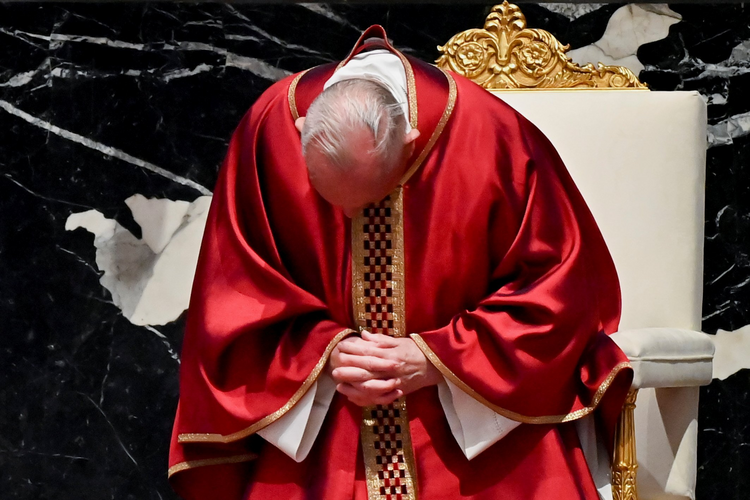While Pope Francis presided over the Liturgy of the Lord’s Passion, the preacher of the papal household called on the bishops and all Catholics to examine their consciences to see how they may be undermining the unity of the Catholic Church.
Pope Francis presided over the liturgy on April 2 at the Altar of the Chair of St. Peter’s Basilica, but as usual, the preacher of the papal house, Cardinal Raniero Cantalamessa, gave the homily while the Pope and more than two dozen cardinals listened .
“The fraternity among Catholics is wounded,” said the cardinal. “Divisions between the churches tore Christ’s tunic into pieces and, worse, each cut strip was cut into even smaller pieces.”
“The fraternity among Catholics is wounded,” said Cardinal Raniero Cantalamessa. “Divisions between the churches tore Christ’s tunic to pieces.”
With only about 150 people present because of the restrictions of COVID-19, Cardinal Cantalamessa clarified that he was talking about “the human element of this, because no one will ever be able to tear the true tunic of Christ, his mystical body animated by the Holy Spirit. In God’s eyes, the church is ‘one, holy, catholic and apostolic’ and will remain so until the end of the world ”.
God’s protection of the Catholic Church, he said, “does not excuse our divisions”, but it makes them even more worthy of condemnation and should inspire greater efforts to heal the divisions.
“The most common cause of the bitter divisions among Catholics,” said the 86-year-old cardinal, “is not dogma, nor sacraments and ministries – none of the things that, by God’s unique grace, we preserve fully and universally.”
“The divisions that polarize Catholics are derived from political options that are transformed into ideologies that take precedence over religious and ecclesial considerations.”
Instead, he said, “the divisions that polarize Catholics stem from political options that become ideologies that take precedence over religious and ecclesial considerations and lead to the complete abandonment of the value and duty of obedience in the Church.”
“This is sin in its primary meaning,” said Cardinal Cantalamessa, who was appointed preacher of the papal household in 1980 by St. John Paul II and has served in office ever since.
When support for political candidates, parties or policies takes precedence over building the kingdom of God and the unity of his body, the church, it is time for “a serious examination of conscience” and conversion, he said.
“Fostering division is the work par excellence of what is called ‘diabolos’, that is, the divider, the enemy who sows tares, as Jesus referred to in the parable” in the Gospel of Matthew.
Catholic bishops and priests “should be the first to make a serious examination of conscience,” said the cardinal. “They need to ask themselves where their flocks are leading – to their position or the position of Jesus.”
The Catholic Church is called to be a force for the unity of all Christians, he said, and that is why Catholics must pray and work for the peace and unity that Jesus desired for his disciples.
The liturgy began with Pope Francis, assisted by two monsignors, prostrating himself on the floor of the basilica in front of the altar. Later, after reading the Passion according to Saint John, the Pope also led the worship of the cross.
A few hours after the evening liturgy, the pope was scheduled to preside over the Way of the Cross in St. Peter’s Square. The service’s meditations were written by children and teenagers and reflect on the crosses that many children around the world carry, especially during the coronavirus pandemic.


